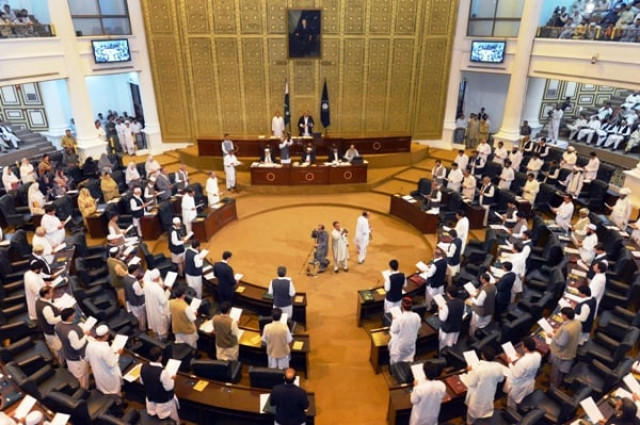Intense politicking: K-P passes LG bill amid much debate
Non-party elections at the grassroots level would lead to fragmentation within political parties, says Attaur Rehman.

Regarding criticism on non-party elections, Inayatullah Khan said that the K-P government was going for tehsil and district government elections on a party basis. PHOTO: AFP/FILE
The Khyber-Pakhtunkhwa Assembly passed the Local Government Bill 2013 on Thursday with a majority of votes. However, opposition lawmakers were against the abolishment of union councils and against non-party elections for village and neighbourhood councils.
The select committee report attached to the bill detailed the amendments to about 33 clauses of the bill – two of which were contested.
Section 26 that deals with setting up villages and neighbourhood councils at grassroots levels and Section 27 that provides a framework for these newly conceived bodies, were questioned by the select committee. The latter section also includes the clause of holding elections in village and neighbourhood councils on a non-party basis. During Thursday’s session, the opposition leader tried not to go with the proposed set-up, but the ruling party’s ministers quickly brushed objections aside, saying that changes could be made in the future.
Jamiat Ulema-e-Islam-Fazl’s (JUI-F) parliamentary leader Maulana Attaur Rehman said that non-party elections at the grassroots level would lead to fragmentation within political parties. He asked the government to retain the union councils in the new set-up.
However, K-P Minister for Local Government Inayatullah Khan differed with his views. He said that union councils were introduced in 1959 under a dictator and now the K-P government wants to devolve powers even below the UC level.
Centralised control led to the dysfunctional municipal and health facilities and devolution of power to the village level will help improve services at the grassroots level, he maintained.
Regarding criticism on non-party elections, Inayatullah Khan said that the K-P government was going for tehsil and district government elections on a party basis.
Meanwhile, Awami National Party’s Sardar Hussain Babak questioned the rationale of village councils and said that the government should give a sustainable system to the province. Establishing over 4,500 village and neighbourhood councils will lead to a phenomenal hike in expenditures, he explained.
However, Minister for Communication and Works Yousuf Ayub said that in previous set-ups, all laws rested with the nazim and the new system envisaged nazim powers for every village council. He said that on average, a single union council comprises about 27,000 people across the province, which could not be categorised as ‘grassroots level’.
He said that the provincial government would give about 30 per cent of the Annual Development Programme (ADP) to the local bodies.
PPP’s Mohammad Ali Shah Baacha and PML-N’s Sardar Aurangzeb Naluhta also opposed the new non-party village councils and the abolishment of UCs. However, Agriculture Minister Shahram Tarakai backed it.
Senior Minister for Finance Sirajul Haq, in his remarks, insisted that the village and neighbourhood councils were an experiment and the clause could be changed. But opposition members still voted against it when the speaker tabled the clauses for a vote.
Published in The Express Tribune, November 1st, 2013.



















COMMENTS
Comments are moderated and generally will be posted if they are on-topic and not abusive.
For more information, please see our Comments FAQ